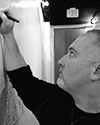 My fifth grade science teacher (Dr. Thomas Mummy) taught me something that I have never forgotten – when determining the best course of action, present opposing viewpoints and what comes out of it will be better than either original argument – then repeat the process. This concept (thesis vs. antithesis = synthesis) is one of the reasons that bloomfield knoble is a successful agency.
My fifth grade science teacher (Dr. Thomas Mummy) taught me something that I have never forgotten – when determining the best course of action, present opposing viewpoints and what comes out of it will be better than either original argument – then repeat the process. This concept (thesis vs. antithesis = synthesis) is one of the reasons that bloomfield knoble is a successful agency.
To an outsider, it may look like the bloomfield knoble ideation process is rife with friction, but frictional force is necessary to begin motion (Fr = Ur/r(N)). Friction, when structured, is also useful in making sure that different ideas are considered and weighed in order to make sure the best possible idea is being put forth. It has long been known that people tend to bend their opinions toward those of the majority (also the subject of my last article). According to Aviva Rutkin, writing in New Scientist, in 2011, Jamil Zaki, a psychologist at Stanford University in California, and colleagues discovered why. It involves the ventromedial prefrontal cortex, a part of the brain’s reward center that lights up when we encounter things we want, like a candy bar.
Zak’s team found that it also activates when people are told what others think, and the more this part of the brain responds to information about group opinion, the more someone will adjust their opinion toward the consensus. Conformity can be useful in our day-to-day lives, letting others serve as a guide in unfamiliar situations, says Lisa Knoll, a neuroscientist at University College London, but it can also lead us into danger. Earlier this year, Knoll published a study in which she asked people to rate the riskiness of texting while crossing the street, driving without using a seat belt and so on. After seeing a number that supposedly represented the evaluations of others, all the volunteers moved their ratings in the direction of the majority, even if that meant downgrading their initial estimate of risk.
That dynamic may have been at work in February 2012, when three members of a skiing group, including pros, sports reporters and industry executives, died in an avalanche on a backcountry slope in Washington state. Keith Carlsen, a ski photographer on the trip, told The New York Times that he’d had doubts about the outing but dismissed them, “There’s no way this entire group can make a decision that isn’t smart.” That same dynamic appears all too often in advertising. There are many examples of ads that fail – or even offend – and make everyone who sees them wonder how it even got made in the first place. Everyone in advertising knows exactly how it happens – someone gets an idea (often a client) and then no one wants to speak out about the idea that the client liked – so it gets made. Doubts get pushed aside and a groupthink mentality sets in that it’s a great campaign and everyone will love it. Then it doesn’t work and suddenly hard lessons are learned – the lesson that it MUST be acceptable for people to speak up / out / against, etc.
It’s not going to be possible to eliminate group errors, but it may be possible to minimize them by finding ways to spark debate. When bloomfield knoble gets together, the project manager encourages people to voice conflicting views. We may also vote on decisions privately rather than voice opposition publicly. Dissent (organized dissent, that is) is encouraged in our offices. Any frustrations from dissenting opinions are usually worked out over a game of ping pong (you should follow us, @bloom_tweets on Periscope to watch one of these games).
Dissent is welcome at bloomfield knoble, because what really matters is that the result of our efforts of thesis vs. antithesis = synthesis generates success for our clients.
About The Author

# # #
Who is bloomfield knoble?
bloomfield knoble is a full-service, premier strategic marketing and advertising agency based in Dallas, Texas. Our clients include top 50 Fortune companies and unique businesses that seek a strategic partner to empower their offerings and growth. Whether developing an integrated advertising campaign, a direct marketing tactical approach, brand framework and positioning exercise, or daily creative, technical and consulting support, bloomfield knoble provides a one-to-one approach. Call Eric Hirschhorn to learn more at 214-254-3805, or eric@bloomweb.com.



